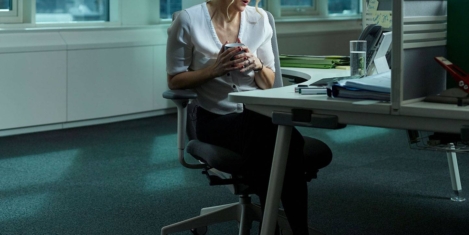April 24, 2018
Reimagining the built environment would transform people’s lives, claims Design Council
 The Design Council and Social Change UK has launched its Healthy Placemaking report which highlights the outcomes from their survey of over 600 built environment practitioners across the UK including architects, town planners and urban designers. The aim of the survey was to gain insight and understanding of their experiences across multiple areas on the creation of a healthy built environment. The latest research from Design Council and Social Change UK claims that healthy placemaking can ‘sit outside mainstream UK housing, public health and placemaking policy. It continues to be seen as a cost to local development rather than an investment, and when considered alongside the plethora of local planning priorities and frameworks it often gets overlooked’.
The Design Council and Social Change UK has launched its Healthy Placemaking report which highlights the outcomes from their survey of over 600 built environment practitioners across the UK including architects, town planners and urban designers. The aim of the survey was to gain insight and understanding of their experiences across multiple areas on the creation of a healthy built environment. The latest research from Design Council and Social Change UK claims that healthy placemaking can ‘sit outside mainstream UK housing, public health and placemaking policy. It continues to be seen as a cost to local development rather than an investment, and when considered alongside the plethora of local planning priorities and frameworks it often gets overlooked’.











 More than half of working adults believe that UK businesses are not doing enough to support the physical and mental wellbeing of their employees. The vast majority (86 percent) believe that firms are specifically not doing enough to help employees deal with work-related stress, anxiety and other mental health issues. And with seven out of 10 of those surveyed by
More than half of working adults believe that UK businesses are not doing enough to support the physical and mental wellbeing of their employees. The vast majority (86 percent) believe that firms are specifically not doing enough to help employees deal with work-related stress, anxiety and other mental health issues. And with seven out of 10 of those surveyed by 










 Two new reports published today reflect increasing concerns about stress and mental ill health at work and a lack of understanding by many organisations in how to combat the problem. A new study by Bupa claims that mental health is now a priority at board level for almost two-thirds (65 percent) of businesses, rising to 72 percent among large corporates, while mental health is now a bigger issue than physical illness among employees for nearly a third (29 percent) of businesses. Yet while an overwhelming majority (96 percent) of businesses want to help support their people, many (57 percent) do not know how to best support employees with these challenges. Two in five (39 percent) admit that awareness and understanding of mental health issues is still low across their organisation. These findings are echoed in a report carried out by Perkbox that claims work is by far the most common cause of stress (59 percent). Yet almost one in two (45 percent) of British businesses do not offer anything to help alleviate this, despite the fact that 1 in 4 (25 percent) struggle to be as productive at work when stressed.
Two new reports published today reflect increasing concerns about stress and mental ill health at work and a lack of understanding by many organisations in how to combat the problem. A new study by Bupa claims that mental health is now a priority at board level for almost two-thirds (65 percent) of businesses, rising to 72 percent among large corporates, while mental health is now a bigger issue than physical illness among employees for nearly a third (29 percent) of businesses. Yet while an overwhelming majority (96 percent) of businesses want to help support their people, many (57 percent) do not know how to best support employees with these challenges. Two in five (39 percent) admit that awareness and understanding of mental health issues is still low across their organisation. These findings are echoed in a report carried out by Perkbox that claims work is by far the most common cause of stress (59 percent). Yet almost one in two (45 percent) of British businesses do not offer anything to help alleviate this, despite the fact that 1 in 4 (25 percent) struggle to be as productive at work when stressed.




 Over a third of workers are adversely affected by a lack of natural light in their office, others complain that the lighting is too bright and a significant proportion say the quality of light provided is so weak they struggle to read. This is according to a new poll which quizzed employees about the difficulties associated with workplace lighting and found that headaches and dizziness were a problem for one in seven. Other employees reported finding the lighting too bright and dazzling (12.4 percent), while one in 10 said they had to strain their eyes due to a general lack of light. A similar proportion said they were bothered by the position of the lights and by the ‘stressful environment’ created by their workplace lighting (9.3 percent each). The findings come as reports of ‘sick building syndrome’ — a condition associated with office work that causes symptoms including headaches and respiratory problems — continue to hit the headlines. Such symptoms are usually attributed to unhealthy or stressful elements of the working environment, such as poor ventilation and lighting.
Over a third of workers are adversely affected by a lack of natural light in their office, others complain that the lighting is too bright and a significant proportion say the quality of light provided is so weak they struggle to read. This is according to a new poll which quizzed employees about the difficulties associated with workplace lighting and found that headaches and dizziness were a problem for one in seven. Other employees reported finding the lighting too bright and dazzling (12.4 percent), while one in 10 said they had to strain their eyes due to a general lack of light. A similar proportion said they were bothered by the position of the lights and by the ‘stressful environment’ created by their workplace lighting (9.3 percent each). The findings come as reports of ‘sick building syndrome’ — a condition associated with office work that causes symptoms including headaches and respiratory problems — continue to hit the headlines. Such symptoms are usually attributed to unhealthy or stressful elements of the working environment, such as poor ventilation and lighting.







